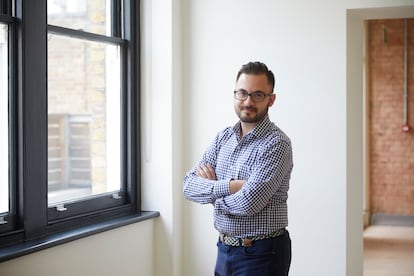Felipe Estefan: ‘Latin America is essential for the global conversation on democracy’
The vice president of Luminate talks about the crisis of representation, legitimacy and information affecting democracy in the region, but expresses optimism for the future


“Latin America is essential to the global conversation on democracy.” Colombian Felipe Estefan is convinced that the region’s “enormous culture of democratic roots,” which emerged from the experiences of suffering under dictatorships, has consolidated an active citizenry whose lessons will prove essential to protecting democracy in the world. Estefan is vice president for Latin America at Luminate, a global non-profit foundation that works to empower people and organizations that have been underrepresented, and is driven by one fundamental question: What would happen if everyone had the power to influence the decisions that affect their lives? He discussed the challenges in Latin America and the state of democracy in an interview with EL PAÍS.
Question. You say that a true democracy is one that aims to reduce inequalities. On that basis, how is democracy in the Latin American region?
Answer. A democracy is not just a system in which people vote and elect a person. For it to work well, it must truly represent the identities and interests of the population, and those who govern must be at the service of a public interest that is understood as prosperity for all. Thus, without representation and diversity there is no true democracy. Unfortunately, in Latin America, the levels of inequality are so wide that we have a crisis of representation in our democracies.
Q. How is this crisis represented?
A. Those who already have power are the people who end up accessing political power and making decisions based on what serves them. A lot of people who are an essential part of society are excluded. When we think of historically excluded populations, we are talking about women, racial and ethnic minorities, indigenous and native peoples, LGBTQI+ communities, young people… people who are not truly represented in democracy. Therefore, the decisions that are made and the public policies that are designed are not necessarily responding to what these communities need. For a democracy to work well, it has to include everyone and be for everyone.
Q. Is that at the root of distrust in democracy?
A. I assign this distrust, basically, to three factors. One has to do with the crisis of representation: people see those who are elected and do not necessarily see themselves, their families, or someone who is defending what they need on a daily basis. There is a gap between what people really feel and need, and what they see those in power doing.
Q. And the others?
A. The other has to do with what I call the crisis of legitimacy. People are expecting results from their rulers and many times they do not see them, in some cases due to corruption, in others due to mismanagement, sometimes due to incompetence. The results that people want and deserve are not necessarily those that those in power are producing. Finally, the third factor is the information crisis.
Q. Why can the latter affect democracy?
A. There are some information manipulation systems, often through social network platforms, in which people are starting to operate based on different realities, different facts, false information or information that has been expressly altered by people who want to manipulate public opinion. This makes it impossible for us to have a democratic dialogue as citizens based on a shared reality. The crisis of representation, plus the crisis of legitimacy and information, lead us to say that we are currently experiencing threats to democracy in Latin America and around the world.
What we have seen lately, in Peru or Ecuador, and now with the Constituent Assembly in Chile, is proof that citizens in Latin America have a democratic culture and the expectation that their rulers will represent them”
Q. This cocktail has already triggered protests throughout the region.
A. What we have seen lately, in Peru or Ecuador, and now with the Constituent Assembly in Chile, is proof that citizens in Latin America have a democratic culture and the expectation that their rulers will represent them. This is reason for hope. There are many signs of hope for democracy.
Q. Why are you optimistic in this context?
A. There are two signs. One is that the citizens of Latin America know what they want and are organizing themselves to be heard. That is a good thing in a democracy. The other is that there is a lot of independent press. Even though this is a region where the press face incredible threats, journalists are doing quality, in-depth investigative work to inform the public and hold those in power accountable. Additionally, we see a greater representation on issues of culture and the stories that are told, who tells what stories, and how we see ourselves as a society. Finally, the citizenry has greater awareness and calls attention to people who manipulate and spread false information and hateful messages. I see a citizenry committed to democracy that wants to participate and to be heard.
Q. Are those in power contributing to this information crisis and hate speech?
A. Latin America has a long history of governments that want to control and manipulate information. It is not only due to technology, but technology has increased the possibility of false or manipulated information spreading quickly through the population. The way in which information is being consumed and distributed is something that cannot be controlled by a ruler, by a government, or by a company; as a society we have to understand how we are going to regulate the actors that allow the manipulation of information ecosystems. Those in power have a responsibility because of the size of the megaphone that they handle: and that is to enter that ecosystem with truthful information.
Q. You work with underrepresented communities. Has the concept of underrepresentation changed over time?
A. The definition of who is excluded is something we constantly explore, because there is never a “mission accomplished” moment on the road to true inclusion and representation. In societies where there are unjust systems of inequity and power, you always have to be thinking about who has been left out, who is not in the conversation, who should have more of a voice, who has been shut out, and why. There are some particularly important issues — although they are not the only ones — such as a very significant gap in terms of political and civic leadership for women and non-binary people.
It is necessary to think about how to build political and civic leadership among women. Colombia and Mexico are the two largest countries in Latin America who have yet to elect a female president”
Q. The underrepresentation of women in power is very accentuated.
A. The gender issue is essential in Latin America. Just look at the photo of the meeting that the president of Brazil organized with South American presidents, which the president of Peru, Dina Boluarte, was unable to attend. There were only men. It is necessary to think about how to build political and civic leadership among women. Colombia and Mexico are the two largest countries in Latin America who have yet to elect a female president.
Q. Have you also analyzed the relationship between young people and democracy?
A. The most recent surveys we did in Argentina, Brazil, Colombia and Mexico showed that people between the ages of 16 and 35 had a less favorable view of democracy than older people. I think this is linked to the crises we were talking about, but also to the fact that younger people do not always feel they have the opportunity of running for office, gaining access to power, and being taken seriously.
Q. What are the main challenges you face in empowering people in Latin America?
A. One of the clearest is violence. For example, the last election in Mexico was the most violent for female candidates. There were a variety of threats and even, unfortunately, assassinations. In Colombia, we also have the same problem, which makes both male and female candidates feel unsafe when campaigning. Another challenge is access to tools, skills, and financial resources. People who are running for office for the first time and who do not know how to become a party member, but who have the passion to be democratic leaders, do not have access to the necessary tools or financing. And the other challenge is discrimination against people from the communities I mentioned. Often they are attacked in a very direct and personal way, through social networks, with sexist, racist, homophobic and classist messages, which make it very difficult for them to feel that it is worthwhile to continue the struggle to access political power.
Q. Luminate is driven by the question: “What would happen if everyone had the power to influence the decisions that affect their lives.” How would that projection be for Latin America?
A. Latin America is central to the global conversation about democracy. The question of whether it is in crisis, if it can be saved, or what kind of democracy we can build is not exclusive to the region, which is central to that debate. This is because Latin America has a culture of democratic roots that comes from the very recent experience of knowing what happens when there is no democracy, and it has a citizenry that wants to participate in the decisions that impact their lives. The challenge is not even to save a version of the democracy that existed before; it is to rebuild and reimagine the democracy that we have always deserved in Latin America, which is a plural, diverse, representative, and efficient democracy.
Sign up for our weekly newsletter to get more English-language news coverage from EL PAÍS USA Edition
Tu suscripción se está usando en otro dispositivo
¿Quieres añadir otro usuario a tu suscripción?
Si continúas leyendo en este dispositivo, no se podrá leer en el otro.
FlechaTu suscripción se está usando en otro dispositivo y solo puedes acceder a EL PAÍS desde un dispositivo a la vez.
Si quieres compartir tu cuenta, cambia tu suscripción a la modalidad Premium, así podrás añadir otro usuario. Cada uno accederá con su propia cuenta de email, lo que os permitirá personalizar vuestra experiencia en EL PAÍS.
¿Tienes una suscripción de empresa? Accede aquí para contratar más cuentas.
En el caso de no saber quién está usando tu cuenta, te recomendamos cambiar tu contraseña aquí.
Si decides continuar compartiendo tu cuenta, este mensaje se mostrará en tu dispositivo y en el de la otra persona que está usando tu cuenta de forma indefinida, afectando a tu experiencia de lectura. Puedes consultar aquí los términos y condiciones de la suscripción digital.








































